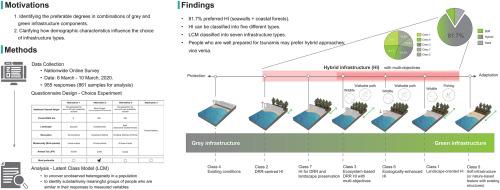Coastal infrastructure typology and people's preference-based grey-green-hybrid infrastructure classifications using a latent class model: A case study of Japan
IF 4.2
1区 地球科学
Q1 GEOSCIENCES, MULTIDISCIPLINARY
International journal of disaster risk reduction
Pub Date : 2024-11-01
DOI:10.1016/j.ijdrr.2024.104992
引用次数: 0
Abstract
Following the 2011 Tohoku earthquake and tsunami in Japan, multiple lines of defence applying various approaches to structural/non-structural coastal defence has gained momentum. These changes have led to accelerate the development of hybrid infrastructure, which combines artificial and natural features, to provide essential defense functions while also harnessing the benefits of ecosystem services, including recreation and biodiversity conservation in Japan. However, the higher the number of services and stakeholder groups targeted, the lower is the capacity to maximise the delivery of each service and simultaneously fulfil the specific needs of each stakeholder group. This study conducted an online survey across Japan and obtained 861 valid responses for the analysis, elucidating the optimal balance between artificial and natural feature using a latent class model. Additionally, we examined whether the anticipated risk of the Nankai Trough earthquake and tsunami influenced perceptions of coastal infrastructure. The results showed that 81.7 % of our respondents favoured hybrid infrastructure, which can be classified into five distinct types with varying levels of grey and natural components. Furthermore, individuals who undertook personal tsunami preparedness measures, such as reviewing hazard maps and participating in evacuation drills, were more inclined to prefer hybrid infrastructure. In contrast, those who were less prepared for tsunamis or took no action tended to lean towards the exclusive installation of either grey or natural infrastructure. There was no statistically significant difference in Nankai Trough tsunami-prone area in preferable coastal infrastructure types; however, it highlighted the potential needs and importance for hybrid infrastructure to be multi-objective.

利用潜类模型对沿海基础设施类型和基于人们偏好的灰绿混合型基础设施进行分类:日本案例研究
2011 年日本东北地区发生地震和海啸后,采用各种方法进行结构性/非结构性海岸防御的多道防线获得了发展势头。这些变化促使日本加快发展混合基础设施,将人工和自然特征相结合,在提供基本防御功能的同时,还利用生态系统服务的益处,包括娱乐和生物多样性保护。然而,针对的服务和利益相关群体数量越多,最大限度地提供每项服务并同时满足每个利益相关群体特定需求的能力就越低。本研究在日本全国范围内开展了一项在线调查,获得了 861 份有效回复以供分析,并利用潜类模型阐明了人工特征与自然特征之间的最佳平衡。此外,我们还研究了南海槽地震和海啸的预期风险是否会影响人们对沿海基础设施的看法。结果表明,81.7% 的受访者青睐混合型基础设施,这些基础设施可分为五种不同类型,其中灰色和自然成分的程度各不相同。此外,采取个人海啸防范措施(如查看灾害地图和参加疏散演习)的人更倾向于选择混合型基础设施。相反,那些对海啸准备不足或没有采取任何行动的人则倾向于只安装灰色或天然基础设施。在统计上,南海海槽海啸易发地区对沿海基础设施类型的偏好没有显著差异;但是,这突显了混合基础设施具有多目标性的潜在需求和重要性。
本文章由计算机程序翻译,如有差异,请以英文原文为准。
求助全文
约1分钟内获得全文
求助全文
来源期刊

International journal of disaster risk reduction
GEOSCIENCES, MULTIDISCIPLINARYMETEOROLOGY-METEOROLOGY & ATMOSPHERIC SCIENCES
CiteScore
8.70
自引率
18.00%
发文量
688
审稿时长
79 days
期刊介绍:
The International Journal of Disaster Risk Reduction (IJDRR) is the journal for researchers, policymakers and practitioners across diverse disciplines: earth sciences and their implications; environmental sciences; engineering; urban studies; geography; and the social sciences. IJDRR publishes fundamental and applied research, critical reviews, policy papers and case studies with a particular focus on multi-disciplinary research that aims to reduce the impact of natural, technological, social and intentional disasters. IJDRR stimulates exchange of ideas and knowledge transfer on disaster research, mitigation, adaptation, prevention and risk reduction at all geographical scales: local, national and international.
Key topics:-
-multifaceted disaster and cascading disasters
-the development of disaster risk reduction strategies and techniques
-discussion and development of effective warning and educational systems for risk management at all levels
-disasters associated with climate change
-vulnerability analysis and vulnerability trends
-emerging risks
-resilience against disasters.
The journal particularly encourages papers that approach risk from a multi-disciplinary perspective.
 求助内容:
求助内容: 应助结果提醒方式:
应助结果提醒方式:


